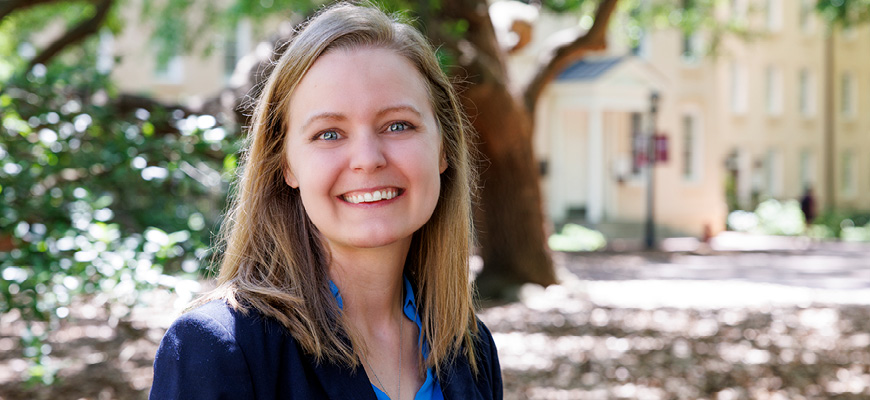
Lessons in geography — and global citizenship
Geography professor Meredith DeBoom is a 2022 Mungo Undergraduate Teaching Award winner
Posted on: November 9, 2022; Updated on: November 9, 2022
By Chris Horn , chorn@sc.edu, 803-777-3687
In Meredith DeBoom’s geography courses, students get more than an education in political geography — they hone the skills to become better informed and more articulate citizens of the world.
“I want students to think about the world differently than when they started the course, to engage with each other and think about how to be part of something bigger than themselves,” says DeBoom, an assistant professor of geography and one of four faculty members to receive the Michael J. Mungo Undergraduate Teaching Award in 2022.
If that sounds like a tall order — engaging with fellow students in conversations about politically sensitive issues, becoming part of something bigger — well, it is. But DeBoom has fashioned a classroom experience that helps students think beyond stereotypes, develop more nuanced understandings of political geography and, hopefully, learn to engage in conversation about sometimes-volatile topics.
“Our first task is not learning about content — it’s to learn about one another and to build community together,” DeBoom says, describing a process in which she and the students cultivate trust and spell out their expectations of one another before they discuss political issues such as borders, nationalism and violence.
“We often talk about students having the right to grow and change and to learn to make mistakes. With that comes the responsibility to contribute to a classroom conversation and to respond in a way that encourages each other’s learning,” says DeBoom, who was a first-gen student in college and was sometimes reticent about speaking up in class as an undergraduate.
I want students to think about the world differently than when they started the course, to engage with each other and think about how to be part of something bigger than themselves.
Meredith DeBoom
“Not all students feel like they can participate well in class discussion, but they’ll take notes for everyone’s benefit, contribute written comments and encourage those speaking up with nonverbal signals like nodding their heads.”
In higher level courses such as Political Geography and Global Geography of Human Rights, DeBoom’s students sometimes struggle with journal articles written by academic scholars. DeBoom posts the papers on Google Docs, and students post their reactions.
“Sometimes I present authors that I know are difficult to read, and I know students are going to be frustrated with reading those papers because they're challenging. They can vent anonymously and see, ‘OK, I'm not alone. We're all on the same page here. We all struggled with this reading, but what can we pull out of it that's useful?’”
DeBoom has started an undergraduate research lab that already has fostered several Honors College theses and has given her more opportunity for mentoring. The lab format also has graduate and undergraduate students working together, DeBoom says. “I find that the comments they give each other on drafts or presentations are sometimes so much more thoughtful and useful than the comments that I can give them.”
DeBoom’s next goal is to introduce larger introductory-level courses to some of the team-building tools used in smaller classes. It’s a way to try to foster some of the same level of discourse and get students more involved in their education — and perhaps become more engaged citizens in the process.